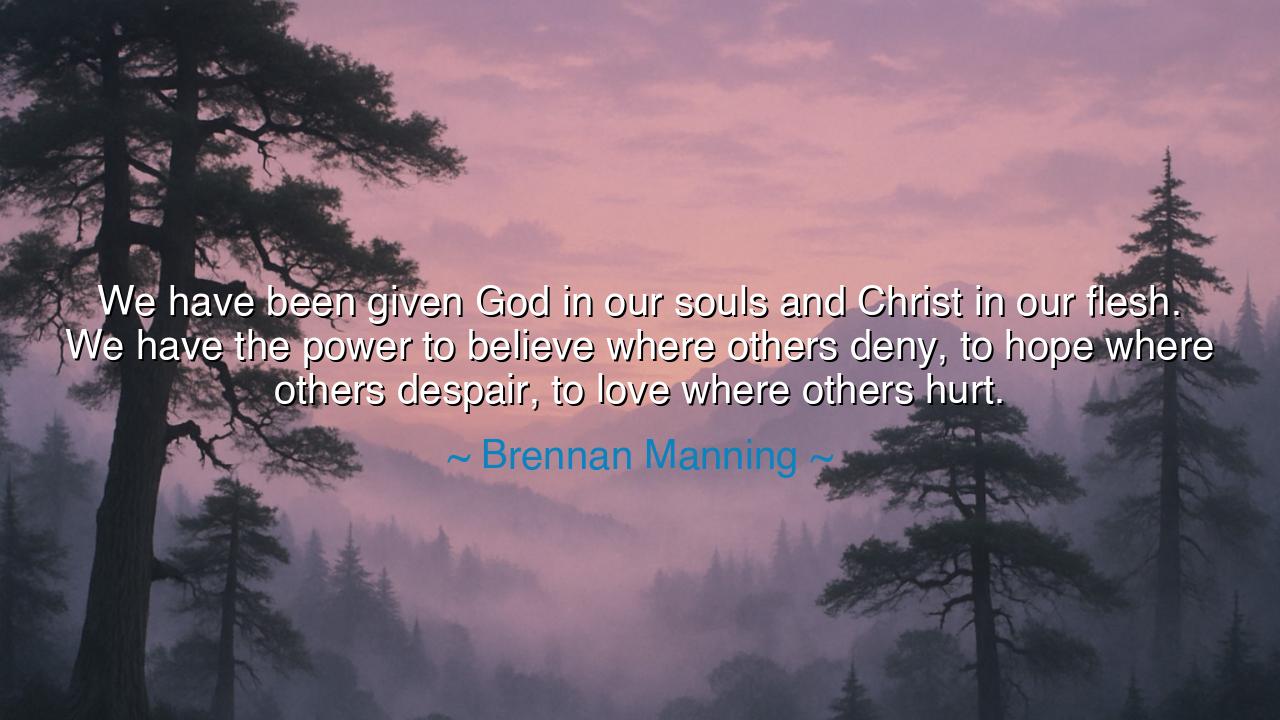
We have been given God in our souls and Christ in our flesh. We
We have been given God in our souls and Christ in our flesh. We have the power to believe where others deny, to hope where others despair, to love where others hurt.






In the radiant words of Brennan Manning, the wandering priest and poet of grace, there shines a vision of divine intimacy and human strength: “We have been given God in our souls and Christ in our flesh. We have the power to believe where others deny, to hope where others despair, to love where others hurt.” These words, forged in the furnace of suffering and faith, are not the musings of a theologian removed from pain—they are the testimony of a man who wrestled with weakness, doubt, and redemption, and who emerged proclaiming that God dwells not in the unreachable heavens alone, but within us. Manning, known for his work The Ragamuffin Gospel, spoke to the broken, the weary, the ones who had fallen, and told them that their very fragility was the place where divine love took root.
The origin of this quote lies in Manning’s lifelong encounter with grace. A former Franciscan priest, soldier, and alcoholic, he lived the paradox of being both sinner and saint, both beggar and beloved. He came to believe that Christ is not distant, but incarnate—alive in every breath, every wound, every act of love. When he says, “God in our souls and Christ in our flesh,” he is declaring that humanity itself is the dwelling place of the sacred. The divine does not hover above the world like an indifferent light—it burns within it, whispering strength to those who believe when faith seems impossible, who hope when the world is in ruin, who love when bitterness reigns.
This teaching echoes the wisdom of the ancients. In the words of St. Paul, “Do you not know that you are temples of the Holy Spirit, and that God’s Spirit dwells in you?” Manning continues this ancient truth, renewing it for a weary generation. For him, belief, hope, and love are not human achievements—they are divine gifts planted in the soil of our humanity. To believe where others deny is to be lit from within by the eternal flame; to hope where others despair is to mirror the very heart of God; to love where others hurt is to participate in the redemption of the world. Each act of faith, each flicker of compassion, is the evidence of Christ in our flesh, acting through us, healing what was once thought unhealable.
Consider the story of Maximilian Kolbe, the Polish priest imprisoned in Auschwitz during the Second World War. When a fellow prisoner—a father—was chosen to die, Kolbe stepped forward and offered his own life in the man’s place. Locked in a starvation cell, he led hymns, comforted others, and blessed his captors until the very end. This is the living expression of Manning’s words: Kolbe believed where others denied, hoped where others despaired, and loved where others inflicted pain. His sacrifice was not the product of mere human courage, but of divine indwelling—the mystery of Christ alive within mortal flesh, transforming suffering into love.
Yet Manning’s message is not reserved for saints alone. It is a call to every soul who feels small, afraid, or unworthy. To say “We have been given God in our souls” is to say that no one is too far gone, no one too broken, to become a vessel of grace. The divine presence does not seek perfection—it seeks openness. When the world descends into cynicism, when voices around us sneer at faith, when pain seems unbearable, Manning reminds us that within each of us lies the power to believe, to hope, and to love—not because we are strong, but because God is within us. The flame may flicker, but it will never be extinguished.
There is also courage in these words—a heroic call to live differently from the world. To believe where others deny is an act of rebellion against despair. It is to look upon a darkened horizon and still see dawn. To hope where others despair is to plant a seed in barren ground, trusting that unseen hands will water it. And to love where others hurt—this is the highest calling of all—to respond to cruelty with kindness, to answer injustice with mercy, to heal with the same hands that have been wounded. Manning teaches that this is not naïve idealism—it is divine participation. To live in such a way is to bring heaven down into the dust of earth.
So, my child of tomorrow, take this truth into your heart: the divine is not distant. God dwells within your soul, and Christ walks in your flesh. When you falter, remember that grace is stronger than failure. When you despair, recall that hope is the heartbeat of God within you. And when the world wounds you, do not harden—love all the more fiercely, for love is the proof that God still breathes in humanity.
Thus, the teaching of Brennan Manning stands as both comfort and challenge: that the holy is not confined to the sacred places, but lives within the fragile heart; that every act of kindness is an echo of eternity; and that, through us, God’s compassion continues to enter the world. Therefore, live not as one abandoned, but as one inhabited by the divine—believing against the darkness, hoping against the odds, and loving beyond the wounds of this world.






AAdministratorAdministrator
Welcome, honored guests. Please leave a comment, we will respond soon